... newer stories
Montag, 14. Juli 2008
July 3rd-13th, 2008 in Reibers and Vienna
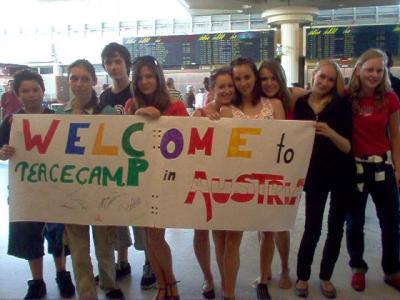
peacecamp, 00:37h
peacecamp 2008: "making peacemakers"
July 3rd-13th, 2008 in Reibers and Vienna
33 teenagers of four different nationalities – Jewish Israelis, Arab Israelis, Hungarians and Austrians – participated in peacecamp 2008, the 6th of its kind, which took place in Reibers, Lower Austria, and in Vienna. They graduated there as "Ambassadors of Peace".
The youngest participant not even 14, the oldest almost 17 years old - an age-gap that remained unnoticed given the wholeheartedness with which these young people coped with most difficult questions: How do war, terror and despotism come about, and how does one find ways out of such catastrophes.
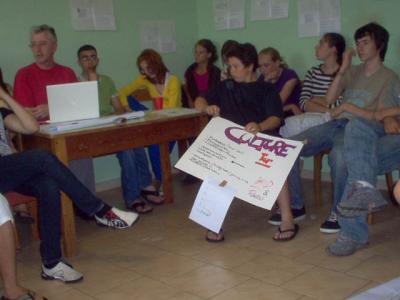
Daily workshops in contemporary history, led by the historian Wolfgang Fritz gave each group the opportunity to outline a piece of history shared with their respective neighbour and to reflect complex issues like the post-world-war fusion of warring European states to a community of states or the creation of the state of Israel after the Holocaust.
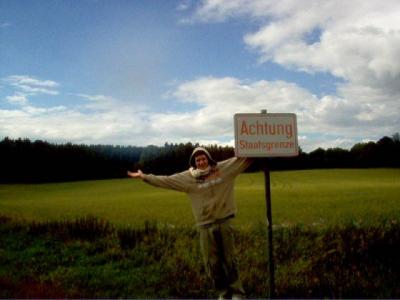
We passed the nearby, now unnoticeable Czech-Austrian border without any border-controls; a contemporary witness told us how it was to live at this spot, when the two bordering countries were separated by the Iron Curtain; other witnesses told us how much their life had changed when the East and West of Europe fused to become a whole, free and democratic community of states. We heard how Jews escaped persecution, expulsion and homicide under Hitler's fascist dictatorship and created their own homeland in a free, autonomous and democratic state of Israel. But we also learned what this meant for the Arab population of this country, what it means to be an Arab Israeli of Palestinian identity, and how the Palestinian fight for an autonomous state for their people affects and complicates the relation between the Jews and the Arabs. We let groups of teenagers discuss topics like "Ways out of the Jewish-Arab conflict", "Attitudes to Minorities", "Xenophobia and Racism" or "From national to shared identity of states and nations". All of this in English.
We were not always sure that we did not ask too much of them with a complex and dense program in a foreign language; but they were so eager to cope with these difficult issues, so serious in their attempt to understand and make themselves understood.
Psychoanalytic large groups, led by the psychiatrist Silvio Gutkowski, offered an opportunity to all, teenagers and adults, to explore their own conscious and unconscious feelings, to discover incongruities in our attitudes, to weigh our emotional reactions against our declared conceptions and to cope with our inner, sometimes unconscious, even despised own racism. The large groups were a place where we could develop some understanding for the "other side of the coin" or to bid for sympathy for our own position.
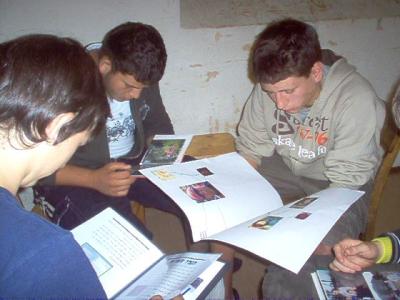
These emotionally strenuous activities were compensated by the sharing of family albums and documents about each participant's own family and biography, by humorous culture evenings and thrilling challenges which could be met only if the group succeeded in joining forces in order to solve mission-impossible outdoor tasks (led by Gerald Muthsam); and of course by all the things which youth from all nations and cultures enjoy most – sitting together, chatting, dancing, making noise and falling in love.
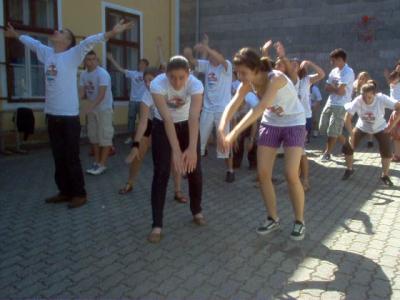
The singing, dancing and music workshops led by Maria Moritz, Linda Frey and Barbara Goesch led to the show4peace which was performed on the last day in Reibers and then in the Dschungel Theatre in the MuseumsQuartier in Vienna. Here the group had a chance to show to a large audience and to public figures from Austrian cultural and political life that they had succeeded in putting aside some of their mutual apprehensions and fears for the benefit of cooperation and that they had been able to create something that they could proudly show to others.
Many tears were shed at Vienna airport on the parting day, when the teenagers had to part from their new friends and, some of them, from their newly found sweethearts…
A second encounter of all four groups is planed to take place in Israel, in spring 2009.
peacecamp 2008 will be assessed by Bianca Blaickner, an expert in intercultural conflict management.
Evelyn Böhmer-Laufer and Ronny Böhmer
13.07.08
July 3rd-13th, 2008 in Reibers and Vienna
33 teenagers of four different nationalities – Jewish Israelis, Arab Israelis, Hungarians and Austrians – participated in peacecamp 2008, the 6th of its kind, which took place in Reibers, Lower Austria, and in Vienna. They graduated there as "Ambassadors of Peace".
The youngest participant not even 14, the oldest almost 17 years old - an age-gap that remained unnoticed given the wholeheartedness with which these young people coped with most difficult questions: How do war, terror and despotism come about, and how does one find ways out of such catastrophes.

Daily workshops in contemporary history, led by the historian Wolfgang Fritz gave each group the opportunity to outline a piece of history shared with their respective neighbour and to reflect complex issues like the post-world-war fusion of warring European states to a community of states or the creation of the state of Israel after the Holocaust.

We passed the nearby, now unnoticeable Czech-Austrian border without any border-controls; a contemporary witness told us how it was to live at this spot, when the two bordering countries were separated by the Iron Curtain; other witnesses told us how much their life had changed when the East and West of Europe fused to become a whole, free and democratic community of states. We heard how Jews escaped persecution, expulsion and homicide under Hitler's fascist dictatorship and created their own homeland in a free, autonomous and democratic state of Israel. But we also learned what this meant for the Arab population of this country, what it means to be an Arab Israeli of Palestinian identity, and how the Palestinian fight for an autonomous state for their people affects and complicates the relation between the Jews and the Arabs. We let groups of teenagers discuss topics like "Ways out of the Jewish-Arab conflict", "Attitudes to Minorities", "Xenophobia and Racism" or "From national to shared identity of states and nations". All of this in English.
We were not always sure that we did not ask too much of them with a complex and dense program in a foreign language; but they were so eager to cope with these difficult issues, so serious in their attempt to understand and make themselves understood.
Psychoanalytic large groups, led by the psychiatrist Silvio Gutkowski, offered an opportunity to all, teenagers and adults, to explore their own conscious and unconscious feelings, to discover incongruities in our attitudes, to weigh our emotional reactions against our declared conceptions and to cope with our inner, sometimes unconscious, even despised own racism. The large groups were a place where we could develop some understanding for the "other side of the coin" or to bid for sympathy for our own position.

These emotionally strenuous activities were compensated by the sharing of family albums and documents about each participant's own family and biography, by humorous culture evenings and thrilling challenges which could be met only if the group succeeded in joining forces in order to solve mission-impossible outdoor tasks (led by Gerald Muthsam); and of course by all the things which youth from all nations and cultures enjoy most – sitting together, chatting, dancing, making noise and falling in love.

The singing, dancing and music workshops led by Maria Moritz, Linda Frey and Barbara Goesch led to the show4peace which was performed on the last day in Reibers and then in the Dschungel Theatre in the MuseumsQuartier in Vienna. Here the group had a chance to show to a large audience and to public figures from Austrian cultural and political life that they had succeeded in putting aside some of their mutual apprehensions and fears for the benefit of cooperation and that they had been able to create something that they could proudly show to others.
Many tears were shed at Vienna airport on the parting day, when the teenagers had to part from their new friends and, some of them, from their newly found sweethearts…
A second encounter of all four groups is planed to take place in Israel, in spring 2009.
peacecamp 2008 will be assessed by Bianca Blaickner, an expert in intercultural conflict management.
Evelyn Böhmer-Laufer and Ronny Böhmer
13.07.08
(0 Kommentare) ... comment
July 3rd-13th 2008, Reibers&Wien
peacecamp, 22:45h
33 Teenager aus vier höchst unterschiedlichen Gruppen – jüdische und arabische Israelis, Ungarn und Österreicher – nahmen vom 3. bis 13 Juli am peacecamp 2008, dem sechsten seiner Art, in Reibers und Wien teil. Mit einem Zertifikat wurden sie zum Abschluss zu "Ambassadors of Peace", zu Botschaftern des Friedens ernannt.
Die Jüngste war noch keine 14, die älteste Teilnehmerin schon fast 17 Jahre alt; eine Spanne, die unbemerkt blieb, weil sich alle, wirklich alle mit größter Gewissen- und Ernsthaftigkeit mit wichtigen und schwierigen Fragen auseinander setzten: Wie Krieg, Terror und Gewaltherrschaft entstehen und welche Wege aus diesen Katastrophen hinausführen.
Tägliche, im Vorfeld von jeder einzelnen Gruppe vorbereitete Präsentationen des mit ihrem jeweiligen Nachbarn gelebten Stücks Zeitgeschichte, sowie vom Historiker Wolfgang Fritz angeleitete Reflexionen zu Themen der Zeitgeschichte – dem Zusammenwachsen der von zwei Weltkriegen gezeichneten Staaten Europas zu einer Staatengemeinschaft, zur Gründung des Staates Israel nach der Shoah – bildeten den neuen und anspruchsvollen Kern des diesjährigen peacecamps. Wir gingen zur nahe gelegenen, nunmehr unsichtbar gewordenen österreichisch-tschechischen Grenze und überschritten diese ohne jegliche Kontrolle; wir ließen uns von einer dort lebenden Zeitzeugin erzählen, wie das Leben an dieser, von einem Eisernen Vorhang geteilten Grenze war; wir hörten von anderen Zeitzeugen, wie der Osten und der Westen Europas nach jahrzehntelanger Spaltung zu einer neuen, freien und demokratischen Gemeinschaft zusammenwuchsen und wie sehr all das das Leben jedes einzelnen Menschen geprägt und verändert hat. Wir hörten, wie die Juden aus der Verfolgung, Vertreibung und Ermordung unter Hitlers faschistischer Diktatur in einem autonomen und freien eigenen Staat Israel eine neue Heimat fanden, aber auch, was dies für die dortige arabische Bevölkerung bedeutet. Wir ließen uns von den arabischen TeilnehmerInnen erzählen, was es bedeutet, ein Araber israelischer Nationalität und palästinensischer Identität zu sein, wie der palästinensische Kampf um einen eigenen, autonomen Staat das Zusammenleben von Juden und Arabern in Israel prägt und zugleich erschwert und ließen eine Gruppe von Teenagern über "Wege aus dem arabisch-israelischen Konflikt" verhandeln. Andere Arbeitsgruppen gingen der "Einstellung zu Minderheiten", dem "Spannungsfeld zwischen nationaler und gemeinsamer Identität von Nationen und Staaten" oder Fragen wie "Xenophobie und Rassismus" nach. Und all das in Englisch, einer allen, TeilnehmerInnen wie Workshop-LeiterInnen, nicht unbedingt geläufigen Fremdsprache.
Wir waren uns nicht immer sicher, unsere Teenager mit dem dichten und anspruchsvollen Programm nicht ein wenig zu überfordern, doch bestätigte ihre durch Sprache und Inhalt geforderte Mitarbeit, dass sie für die entwickelten und zu diskutierenden Themen das nötige Interesse aufbringen konnten.
Ihre bewussten und unbewussten Gefühle, Einstellungen und Gedanken über sich selbst und Andre konnten alle, Teenager wie Erwachsene, in den vom Psychiater Silvio Gutkowski geleiteten psychoanalytischen Großgruppen reflektieren. Hier flossen manchmal auch Tränen, wenn man sich mit Fragen moralischen Rechts und Unrechts oder den eigenen, oft unbewussten Gefühlseinstellungen, wie zum Beispiel dem eigenen inneren Rassismus, zu konfrontieren hatte. Hier konnte man für die Sicht des Anderen Verständnis entwickeln, aber auch um Sympathie für den eigenen Standpunkt werben.
Ausgleich brachten der Austausch über die mitgebrachten Familienstammbäume und Fotoalben, die heiter-humorvollen "Kulturabende" mit ihren informativen, musikalischen, kulinarischen und anderen Schmankerln, die Herausforderung bei spannenden "Outdoor-Aktivitäten" (Workshop-Leiter Gerald Muthsam), die die TeilnehmerInnen vor "Mission Impossible-Aufgaben" stellten, die erst durch das Zusammenlegen von Kräften und Ressourcen lösbar wurden, vor allem aber die Jugendlichen aller Nationen gemeinsame Freude am geselligen Beisammensein, Singen, Tanzen, Musizieren, Lärm machen und Verlieben.
Die von den Tanz- und Musikpädagoginnen Linda Frey, Maria Moritz und Barbara Goesch angeleiteten Workshops führten zur show4peace, die bei den Abschlussfeiern in Reibers und im Dschungel Wien (im MuseumsQuartier) vor viel Publikum und Vertretern von Politik und Medien aufgeführt wurde. Sie dokumentiert den gelungenen Versuch von Jugendlichen aus unterschiedlichen, teilweise in Konflikt befindlichen Nationen zu kooperieren und etwas Herzeigbares zu produzieren, auf das sie zu Recht stolz sein konnten.
Am Flughafen Wien-Schwechat flossen zum Abschied viele Tränen, weil man von neu gefundenen Freunden, auch vom neuen Herzblatt Abschied nehmen musste.
Geplant ist eine zweite Begegnung aller – in Israel, im Frühjahr 2009.
Die wissenschaftliche Begleitung und Aufarbeitung mittels Beobachtungsprotokollen und Tiefeninterviews erfolgt durch Bianca Blaickner, Expertin in Interkulturellem Konflikt-Management. Unterstützt und komplettiert wurde das Team von insgesamt 15 Erwachsenen durch Sonja Haberbusch sowie fünf begleitende LehrerInnen aus Israel und Ungarn.
Evelyn Böhmer-Laufer und Ronny Böhmer
13.07.08
Die Jüngste war noch keine 14, die älteste Teilnehmerin schon fast 17 Jahre alt; eine Spanne, die unbemerkt blieb, weil sich alle, wirklich alle mit größter Gewissen- und Ernsthaftigkeit mit wichtigen und schwierigen Fragen auseinander setzten: Wie Krieg, Terror und Gewaltherrschaft entstehen und welche Wege aus diesen Katastrophen hinausführen.
Tägliche, im Vorfeld von jeder einzelnen Gruppe vorbereitete Präsentationen des mit ihrem jeweiligen Nachbarn gelebten Stücks Zeitgeschichte, sowie vom Historiker Wolfgang Fritz angeleitete Reflexionen zu Themen der Zeitgeschichte – dem Zusammenwachsen der von zwei Weltkriegen gezeichneten Staaten Europas zu einer Staatengemeinschaft, zur Gründung des Staates Israel nach der Shoah – bildeten den neuen und anspruchsvollen Kern des diesjährigen peacecamps. Wir gingen zur nahe gelegenen, nunmehr unsichtbar gewordenen österreichisch-tschechischen Grenze und überschritten diese ohne jegliche Kontrolle; wir ließen uns von einer dort lebenden Zeitzeugin erzählen, wie das Leben an dieser, von einem Eisernen Vorhang geteilten Grenze war; wir hörten von anderen Zeitzeugen, wie der Osten und der Westen Europas nach jahrzehntelanger Spaltung zu einer neuen, freien und demokratischen Gemeinschaft zusammenwuchsen und wie sehr all das das Leben jedes einzelnen Menschen geprägt und verändert hat. Wir hörten, wie die Juden aus der Verfolgung, Vertreibung und Ermordung unter Hitlers faschistischer Diktatur in einem autonomen und freien eigenen Staat Israel eine neue Heimat fanden, aber auch, was dies für die dortige arabische Bevölkerung bedeutet. Wir ließen uns von den arabischen TeilnehmerInnen erzählen, was es bedeutet, ein Araber israelischer Nationalität und palästinensischer Identität zu sein, wie der palästinensische Kampf um einen eigenen, autonomen Staat das Zusammenleben von Juden und Arabern in Israel prägt und zugleich erschwert und ließen eine Gruppe von Teenagern über "Wege aus dem arabisch-israelischen Konflikt" verhandeln. Andere Arbeitsgruppen gingen der "Einstellung zu Minderheiten", dem "Spannungsfeld zwischen nationaler und gemeinsamer Identität von Nationen und Staaten" oder Fragen wie "Xenophobie und Rassismus" nach. Und all das in Englisch, einer allen, TeilnehmerInnen wie Workshop-LeiterInnen, nicht unbedingt geläufigen Fremdsprache.
Wir waren uns nicht immer sicher, unsere Teenager mit dem dichten und anspruchsvollen Programm nicht ein wenig zu überfordern, doch bestätigte ihre durch Sprache und Inhalt geforderte Mitarbeit, dass sie für die entwickelten und zu diskutierenden Themen das nötige Interesse aufbringen konnten.
Ihre bewussten und unbewussten Gefühle, Einstellungen und Gedanken über sich selbst und Andre konnten alle, Teenager wie Erwachsene, in den vom Psychiater Silvio Gutkowski geleiteten psychoanalytischen Großgruppen reflektieren. Hier flossen manchmal auch Tränen, wenn man sich mit Fragen moralischen Rechts und Unrechts oder den eigenen, oft unbewussten Gefühlseinstellungen, wie zum Beispiel dem eigenen inneren Rassismus, zu konfrontieren hatte. Hier konnte man für die Sicht des Anderen Verständnis entwickeln, aber auch um Sympathie für den eigenen Standpunkt werben.
Ausgleich brachten der Austausch über die mitgebrachten Familienstammbäume und Fotoalben, die heiter-humorvollen "Kulturabende" mit ihren informativen, musikalischen, kulinarischen und anderen Schmankerln, die Herausforderung bei spannenden "Outdoor-Aktivitäten" (Workshop-Leiter Gerald Muthsam), die die TeilnehmerInnen vor "Mission Impossible-Aufgaben" stellten, die erst durch das Zusammenlegen von Kräften und Ressourcen lösbar wurden, vor allem aber die Jugendlichen aller Nationen gemeinsame Freude am geselligen Beisammensein, Singen, Tanzen, Musizieren, Lärm machen und Verlieben.
Die von den Tanz- und Musikpädagoginnen Linda Frey, Maria Moritz und Barbara Goesch angeleiteten Workshops führten zur show4peace, die bei den Abschlussfeiern in Reibers und im Dschungel Wien (im MuseumsQuartier) vor viel Publikum und Vertretern von Politik und Medien aufgeführt wurde. Sie dokumentiert den gelungenen Versuch von Jugendlichen aus unterschiedlichen, teilweise in Konflikt befindlichen Nationen zu kooperieren und etwas Herzeigbares zu produzieren, auf das sie zu Recht stolz sein konnten.
Am Flughafen Wien-Schwechat flossen zum Abschied viele Tränen, weil man von neu gefundenen Freunden, auch vom neuen Herzblatt Abschied nehmen musste.
Geplant ist eine zweite Begegnung aller – in Israel, im Frühjahr 2009.
Die wissenschaftliche Begleitung und Aufarbeitung mittels Beobachtungsprotokollen und Tiefeninterviews erfolgt durch Bianca Blaickner, Expertin in Interkulturellem Konflikt-Management. Unterstützt und komplettiert wurde das Team von insgesamt 15 Erwachsenen durch Sonja Haberbusch sowie fünf begleitende LehrerInnen aus Israel und Ungarn.
Evelyn Böhmer-Laufer und Ronny Böhmer
13.07.08
(0 Kommentare) ... comment
Mittwoch, 11. Juni 2008

Evelyn Böhmer-Laufer
Author of the peacecamp-project
peacecamp, 15:57h
I am Evelyn. In the picture, you see me with my husband Ronny at the peacecamp stand of the Jewish Street Festival in Vienna, trying to raise money for peacecamp.
I have been living in Israel for many years and am now living in Vienna. I am a Jewish Austrian, an Austrian Jew, a Jewish Israeli, an Israeli with European roots . I know a lot about the suffering of both, Jews and Arabs, and both people's quest for an own and safe homeland. I also know a lot about the situation of the Jews and their suffering throughout history as a people without a homeland. I therefore support the idea of a homeland for the Jewish people and can also sympathize with the Arab quest for a homeland for their people.
Ronny and I are the only "steady" peacecamp-team members. We do this benevolently in our really limited spare time, aside our bread-earning full-time jobs in our professions. We have been organizing peacecamps since 2004 with young participants from Jewish and Palestinian neighbourhoods in Israel and youngsters from European countries - Slovenia, Hungary and Austria. peacecamp 2008 will be the 6th of its kind. Many people were very helpful; we would not have succeeded to realise any of the peacecamps without them. They have generously supported the peacecamp-project with time and money. We can never thank them enough for this.
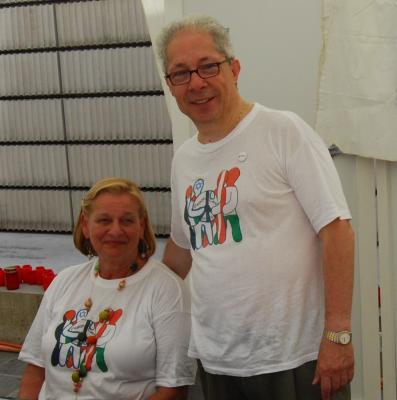
Why are we putting so much of our time and energy into the peacecamp-idea? I was always concerned about wars, terror, about the Holocaust and all the man-made catastrophes that people have brought upon themselves in the course of human history. My parents survived the Holocaust, but many members of their families were murdered by the Nazis.
When I was a child, I used to dream about a world in which there would be no borders between the countries and no differences between people of different origin and religion. I dreamt about a world in which all people would be free and equal, and about countries which would be a home for all the people who would live in them and care about them.
I often thought that there is so much hatred and violence in the world because our parents and grandparents have been victims of wars, terror, violence and injustice and are full with resentment which they pass on to their children. And now the children believe that it's only fair to take revenge for what was done to their parents, and spread new violence and inflict new suffering to the new generation.
I therefore decided to offer young people of different cultural backgrounds an opportunity to meet and learn about one another, to share their pain and to make up their own mind about things that they were told by their teachers and parents.
I must admit that there is nothing that I could tell you or teach you about how to make peace in a violent world. I must admit that I do not know. That no adult knows. That most adults who have tried, have failed.
I have the hope that the young may find ways to make the world more peacecful.
I actually believe that young people are sometimes more clever, more creative and more inventive than grown-up people. Maybe they can find the answers to the questions that the grown-ups are unable to answer or even to ask.
I am therefore very much looking forward to
peacecamp 2008.
I have been living in Israel for many years and am now living in Vienna. I am a Jewish Austrian, an Austrian Jew, a Jewish Israeli, an Israeli with European roots . I know a lot about the suffering of both, Jews and Arabs, and both people's quest for an own and safe homeland. I also know a lot about the situation of the Jews and their suffering throughout history as a people without a homeland. I therefore support the idea of a homeland for the Jewish people and can also sympathize with the Arab quest for a homeland for their people.
Ronny and I are the only "steady" peacecamp-team members. We do this benevolently in our really limited spare time, aside our bread-earning full-time jobs in our professions. We have been organizing peacecamps since 2004 with young participants from Jewish and Palestinian neighbourhoods in Israel and youngsters from European countries - Slovenia, Hungary and Austria. peacecamp 2008 will be the 6th of its kind. Many people were very helpful; we would not have succeeded to realise any of the peacecamps without them. They have generously supported the peacecamp-project with time and money. We can never thank them enough for this.

Why are we putting so much of our time and energy into the peacecamp-idea? I was always concerned about wars, terror, about the Holocaust and all the man-made catastrophes that people have brought upon themselves in the course of human history. My parents survived the Holocaust, but many members of their families were murdered by the Nazis.
When I was a child, I used to dream about a world in which there would be no borders between the countries and no differences between people of different origin and religion. I dreamt about a world in which all people would be free and equal, and about countries which would be a home for all the people who would live in them and care about them.
I often thought that there is so much hatred and violence in the world because our parents and grandparents have been victims of wars, terror, violence and injustice and are full with resentment which they pass on to their children. And now the children believe that it's only fair to take revenge for what was done to their parents, and spread new violence and inflict new suffering to the new generation.
I therefore decided to offer young people of different cultural backgrounds an opportunity to meet and learn about one another, to share their pain and to make up their own mind about things that they were told by their teachers and parents.
I must admit that there is nothing that I could tell you or teach you about how to make peace in a violent world. I must admit that I do not know. That no adult knows. That most adults who have tried, have failed.
I have the hope that the young may find ways to make the world more peacecful.
I actually believe that young people are sometimes more clever, more creative and more inventive than grown-up people. Maybe they can find the answers to the questions that the grown-ups are unable to answer or even to ask.
I am therefore very much looking forward to
peacecamp 2008.
(0 Kommentare) ... comment
Dienstag, 20. Mai 2008
A film about peacecamp2006
in Franzen, Waldviertel
by Georg Geutebrück
peacecamp, 01:48h
(0 Kommentare) ... comment
please note that some texts appear in both, German and English. Please scroll down to find the English version of any articles written in German
peacecamp, 01:44h
(0 Kommentare) ... comment
... older stories
